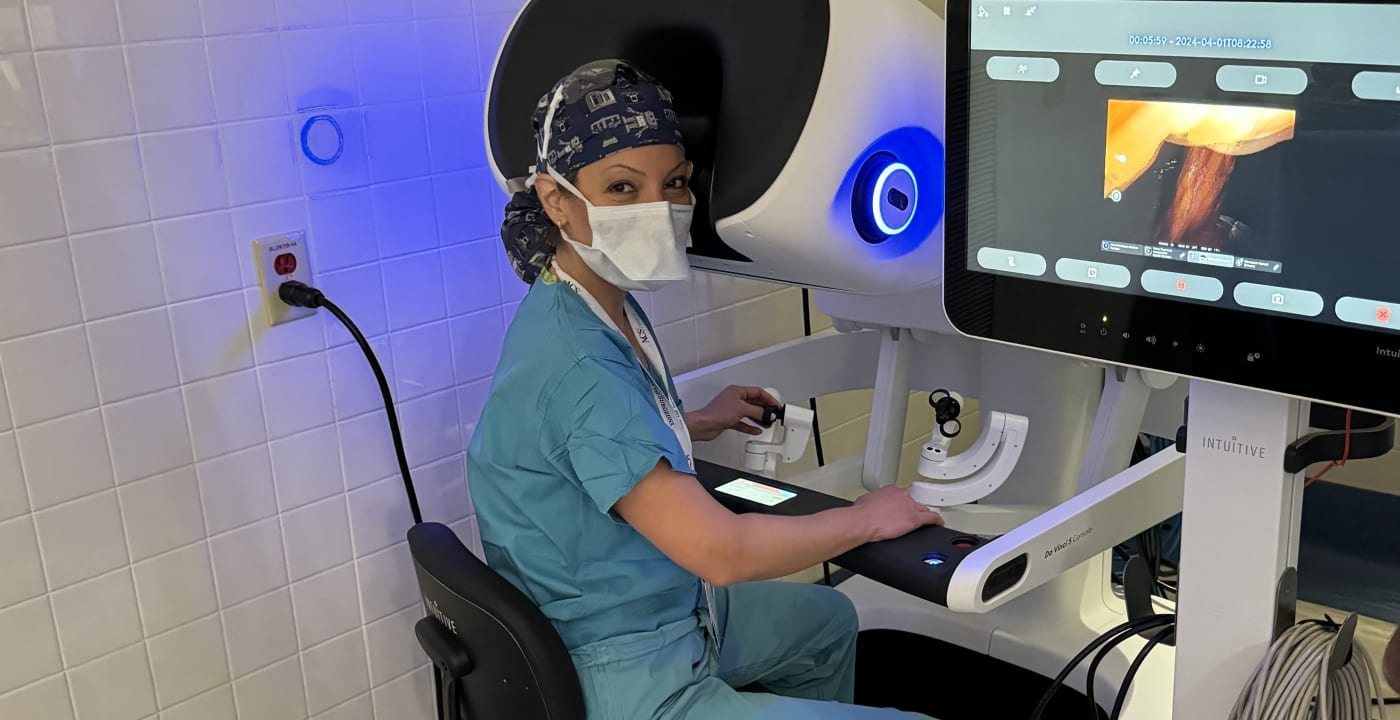Clinical trial may help improve outcomes for colorectal surgery

Early symptoms of colorectal cancer can be subtle, so much so that you might be inclined to ignore them. That’s what happened to 44-year-old Chad Smith.
He noticed blood in his stool for a few months but thought the culprit was a hemorrhoid, or some other mild problem, that would likely resolve on its own. Then one day in September 2022, his symptoms escalated.
A commercial plumber, Smith was maneuvering through a crawl space beneath a restaurant when a pipe pushed against his stomach.
“A few minutes later when I got out of that crawl space, I threw up and there was a lot of blood,” Smith says. “I knew something wasn’t right.”
Smith went to a MultiCare Indigo Urgent Care and received a referral for more testing. Ultimately, the week before he turned 45, Smith was diagnosed with colorectal cancer.
“Half of the patients I treat for this disease now are less than 50 years old,” says Laila Rashidi, MD, FACS, FASCRS, a board-certified colorectal surgeon at MultiCare. “While we don’t know exactly why colon cancer rates are increasing among younger adults, this disease is highly treatable if it’s detected early.”
A history with cancer
This was not the first time Smith and his family dealt with cancer. Before Smith’s own experience, his son was diagnosed with a neuroblastoma in his spine at the age of 1. He received treatment for this rare cancer at MultiCare Mary Bridge Children’s.
It was a difficult time for Smith and his wife as they balanced caring for a child in the hospital with the needs of their older son.
“I’m not a religious man,” Smith says. “But I remember one day driving home from the hospital saying, ‘All right God or whoever, if you’re out there, spare my son and you give me the cancer.’”
Five years later, with his youngest son healthy and the cancer in remission, Smith was facing his own diagnosis.
“I’d make that same prayer or wish or whatever you want to call it 1,000 times over to make sure he’s OK,” Smith says. “That’s just what it means to be a dad.”
Protect your colorectal health
Early detection of colorectal cancer can save your life and make treatment more manageable. If you notice any of these symptoms, make an appointment with your doctor or other health care provider:
- Changes in bowel habits that last more than a few days
- Rectal bleeding with bright red blood
- Blood in the stool
- Cramping or pain in the belly
- Decreased appetite
- Unintended weight loss
Making surgery safer through research
Smith recalls that one of the hardest parts of his experience was sitting down to tell his children, ages 6 and 8 by then, about his colorectal cancer diagnosis.
“It wasn’t an easy conversation to have, particularly given everything we’d gone through, and there were still a lot of unknowns about what the future would hold for us,” Smith says.
Soon after that conversation, he began what felt like a “whirlwind” of treatment — multiple rounds of chemotherapy and radiation followed by robotic-assisted surgery to remove the cancer.
As part of his treatment, Smith decided to participate in a phase 2 clinical trial evaluating the intravenous injection of a dye during his surgery.
Injury to the ureter — the tube that allows urine to pass from the kidney to the bladder — can sometimes be a complication of abdominal surgeries like Smith’s, as well as some pelvic surgeries. These injuries can lengthen post-surgical recovery and may result in patients having to undergo further procedures.
“As a surgeon, I think you always have to look for ways to innovate, to make surgery less invasive and to help people recover faster,” says Dr. Rashidi, who — in addition to being a member of Smith’s care team — is principal investigator on the trial.
She continues, “This study will help determine whether injecting a dye can improve visualization of the ureter during surgery, potentially making the operation safer and also reducing the risk of complications.”
MultiCare Tacoma General Hospital is one of only three sites in the country, and worldwide, conducting this study for colorectal surgery. The MultiCare Institute for Research & Innovation partners with MultiCare facilities, like Tacoma General, as well as community medical practices, to elevate patient care through research.
“When Dr. Rashidi and I talked about it, it was really a no-brainer to do the study,” Smith says. “The potential side effects of the dye were minimal, and if participating could help me and support the greater good, then I felt like it was definitely worth doing.”
Recovering and moving forward
Smith’s surgery was successful, without complications and, perhaps best of all, today he is cancer-free. He credits the treatment regimen, the investigational dye used during his surgery and the expertise of his care team for his positive outcome.
“Everybody who took care of me, from Dr. Rashidi to the nurses who gave me chemo, had such an uplifting attitude,” Smith says. “I’m really grateful to them for seeing me and my family through this.”
Reflecting on his experience, Smith also feels gratitude for his own personal shift in perspective.
“I’m more family oriented now,” he says. “I realize just how much those little things, like taking my kids to their first day of school, mean to them and to me.”
What's next
- Learn more about colorectal cancer prevention and screening
- Find out what happens during a colonoscopy
- Search for open clinical trials and studies at the MultiCare Institute for Research & Innovation



